Can America find its way under Biden?

Over the last three years, Donald Trump's foreign policy has kept a stranglehold on China. But after going through a great stress test and much soul-searching, many people in China actually like the unconventional president.
They think that Trumpism is good for China in the long run, because it exacerbates the fissures and conflicts in the US. Furthermore, it is catastrophic for America's credibility and the liberalist order established by the US after World War II, so it makes room for the rise of China. These "gloaters" even gave Trump the moniker of Chuan Jianguo (Trump who builds our nation), in honour of his role in helping to build a strong China. They were disappointed when Trump lost the presidential election.
Trump is highly untrustworthy as far as his personal conduct goes, and his character is questionable. In particular, his habitual lying and the stomach-turning way he toots his own horn are unacceptable to the American mainstream. He does not attempt to assemble a united front against a common enemy. Instead, everywhere he turns, he applies pressure to the breaking point, causing destruction and offending people. He does not seem the right leader to make America great again.
Trump's America First approach was focused on fixing things on the domestic front, which is exactly what the Chinese Communist Party currently believes in too. The idea shared by both sides is that anything can be done easily when the nation is strong.
Even so, he still garnered 75 million votes in the presidential election of 2020. This figure is among the very highest seen in the history of these polls, exceeded only by that for Biden. This indicates not only the extent to which American society is divided, but also that Trump's policies enjoy strong popular support. His defeat has more to do with his personal failings and the coronavirus pandemic that came out of the blue, rather than where his policies were going.
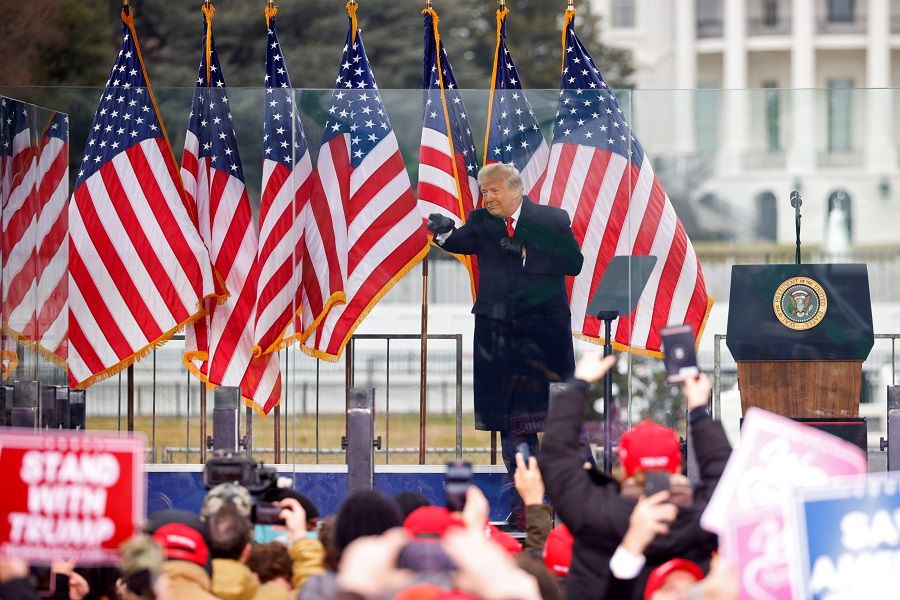
Trump's America First approach was focused on fixing things on the domestic front, which is exactly what the Chinese Communist Party currently believes in too. The idea shared by both sides is that anything can be done easily when the nation is strong. The US actually has more going for it: towering scientific and technological prowess, robust education and human resources, soft power that gathers the best talents from all over the world, abundance of capital, the global hegemony of the US dollar, an unrivalled spirit of innovation and entrepreneurship, not to mention the wide acceptance of its values by the world at large, its many allies, secure geographical position, rich natural resources, highly developed agriculture, etc.
Being down to earth, Trump's policies were welcomed by the middle and lower strata of society. As far as the domestic situation was concerned, his four years in office have seen stellar results, such as new heights reached in employment, revenue, the stock market and economic growth. Reviving the economy, reforging the national identity and returning to the traditional morals and values that the nation was built upon takes major changes in policy orientation. Trump managed to do all that, even though the process was painful and fraught with conflict.
Nevertheless, if the US can whip its own economy and society back into shape, it may still regain leadership with little difficulty. America will continue to lead the global herd for quite a long time to come in any case.
After Trump, will Biden be able to repair and rebuild?
Trump has rocked the foundations of the post-war international order and weakened America's global standing. Nevertheless, if the US can whip its own economy and society back into shape, it may still regain leadership with little difficulty. America will continue to lead the global herd for quite a long time to come in any case. The mainstream countries will try to nudge the US back into playing its role, and not turn towards China (unless China makes some major adjustments itself). After all, no other country's capabilities and experience come close to the US's.
Now then, will Biden be able to reinvigorate America? The key lies in whether or not the Democrats will fall back into the old rut.
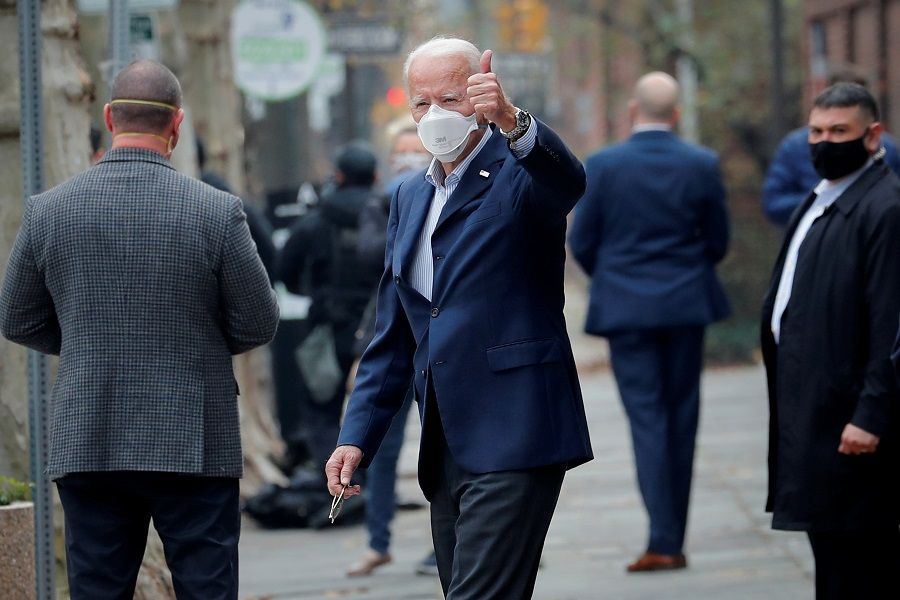
The Republicans pride themselves as a party of "common sense", and brand the Democrats as the party of "political correctness". These characterisations do make some sense. Biden counts as one of the more moderate and pragmatic centrists of the Democratic Party. But this has limited bearing since both parties have grown more extreme with widening social fissures. Of the powerful people who rallied behind Biden and elevated him to the presidency, the most prominent ones were leftists represented by the likes of Elizabeth Warren and Bernie Sanders. It is their radical propositions and slogans that have fuelled America's identity politics, culture wars, and led to its national identity and governance crisis.
Threat of the radical left
Over the past year, American politics has become more radical. Violent incidents of vandalism, looting and so on have become commonplace in protest movements on the streets; shootings and police brutality have occurred again and again; urban centres like Seattle and Portland have been taken over by protesters; right-wing militia groups and fascist organisations have been revitalised. The Democrats attribute all this to social injustice. They have a new concept for it - systemic racism. Opposition against systemic racial discrimination is set to be an important part of Biden's policy agenda.
Liberal intellectuals and street activists even used their ammunition on America's own historical figures at some point. They dragged out the founding fathers and every president since the American War of Independence for a political reckoning, not sparing even Abraham Lincoln, who gave his life to the cause of abolishing slavery. They engaged in historical nihilism, ruining monuments and statues of personalities from the past. Even Virginia's statue of the Confederate general Robert E. Lee from the US Capitol.
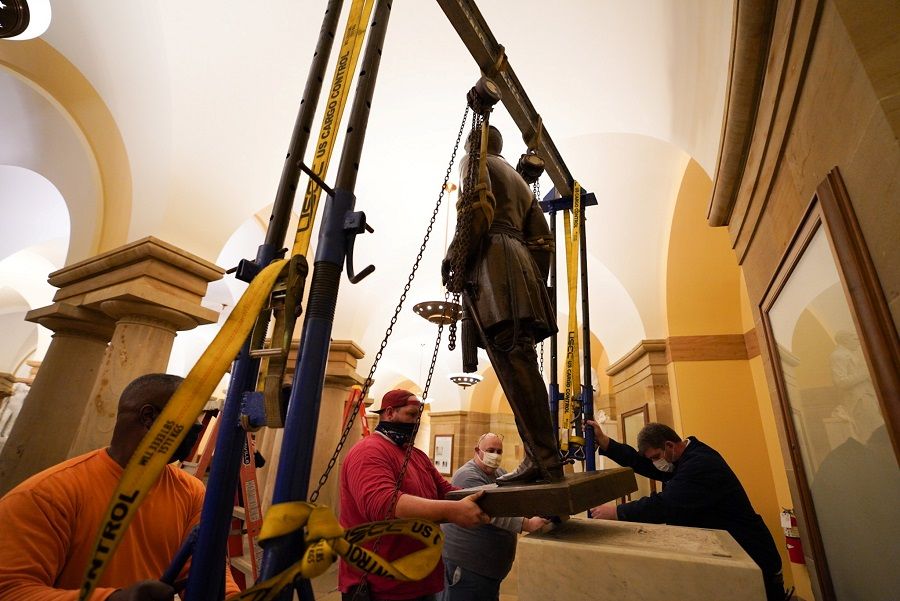
In a speech given before the giant sculpted figures of four American presidents at Mount Rushmore, Trump accused the leftists of starting a "cultural revolution". He called upon the people to rise up against this leftist outrage and defend America's cultural traditions. Back in 2017 when he was visiting Europe, Trump had already spoken of restoring the dominance of Western culture, precisely a proposition that the "multiculturalism" of the liberalists would not stand for.
Bipartisan politics is perennially mired over vacuous issues of political correctness, consuming an enormous amount of time and energy. Both the plight of the white blue-collars and the decline of the middle class are neglected. The truly important matters of the national economy and of the people's livelihoods get marginalised. Numerous urgent issues drag on and fester indefinitely until it is too late to remedy.
The blue-collar workers, traditionally the social base for the Democrats, need pragmatic policies, yet their circumstances had seen no improvement at all for a long time. In fact, their situation has been getting worse. Tired of being represented by the Democratic Party for so long, they flocked to Trump's side.
Democrats need to take care of the working class
Members of the political elite (such as Hillary Clinton) typically come from a middle-class family, graduated from an Ivy League school, lived a privileged life far above poverty. Yet they pretend to understand the poor, for whom they seemed to fight as a way to embellish their political position. With no true appreciation of the circumstances and needs of the underclass, they assume that what these folks need most are the legalisation of same-sex marriage, the abortion rights, greater welfare spending and more government subsidies.
The blue-collar workers, traditionally the social base for the Democrats, need pragmatic policies, yet their circumstances had seen no improvement at all for a long time. In fact, their situation has been getting worse. Tired of being represented by the Democratic Party for so long, they flocked to Trump's side. As described in the bestseller Hillbilly Elegy, the Democrats' supposed "policies for the people" had long lost touch with reality, so much so that they gradually lost the votes of the blue-collar demographic. Ironically, it was the Democratic Party itself that prepared a social base for the rise of Trump the billionaire maverick.
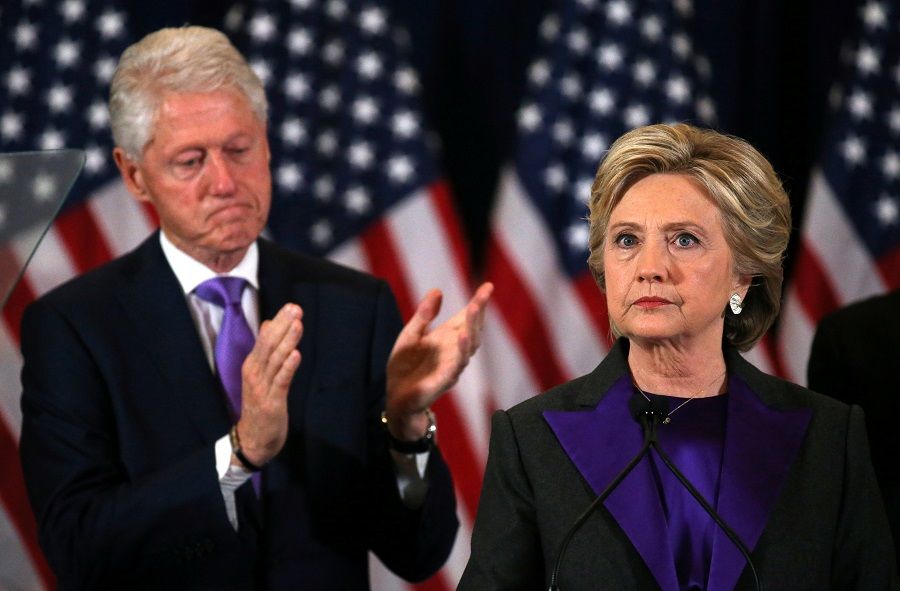
While Hillary Clinton was flirting with Wall Street and collecting huge amounts of speech fees, she described the poor who supported Trump as a "basket of deplorables". This betrays the disdain held by much of the elite for tens of millions of American voters. The ignorance embedded in such disdain is all too common among the "white leftists".
The politics of political correctness was born out of the ideology of the middle class. It was highly representative and widely bought into during the golden age of America's post-war bourgeoisie. However, the American middle class is no longer what it used to be. Its position has been dramatically undermined by the new tech revolution and globalisation. Its members feel insecure and their numbers are dwindling. While the people's political wish list has already shifted its focus onto sustenance of livelihood, the well-fed elite fail to notice and are still squabbling over matters of political correctness.
Undoubtedly, America cannot turn things around if its politics continues to go down this path. It will keep dissipating the strength of the country. If Biden, carried along by the radical forces within his party, continues on this road, then from China's viewpoint, his contribution may very well be more substantially significant than that of "Trump who builds our nation".
In any case, there needs to be political reform before there can be any substantial policy change, and the constitutional set-up put in place by the framers makes such reform exceedingly difficult if not impossible.
More pragmatism, less political correctness
The US needs a strong, steady and pragmatic leadership. Will Biden be able to re-energise the US? The answer depends on whether or not he is sufficiently visionary, wise and competent to reorient the Democratic Party and revamp its policies. The prospect, however, is not optimistic. The new president is already close to 80 years old. He is a seasoned politician who has immersed himself in traditional politics for almost five decades. The picks for his Cabinet are also mostly familiar faces, and among them are a significant number of radicals. In any case, there needs to be political reform before there can be any substantial policy change, and the constitutional set-up put in place by the framers makes such reform exceedingly difficult if not impossible.
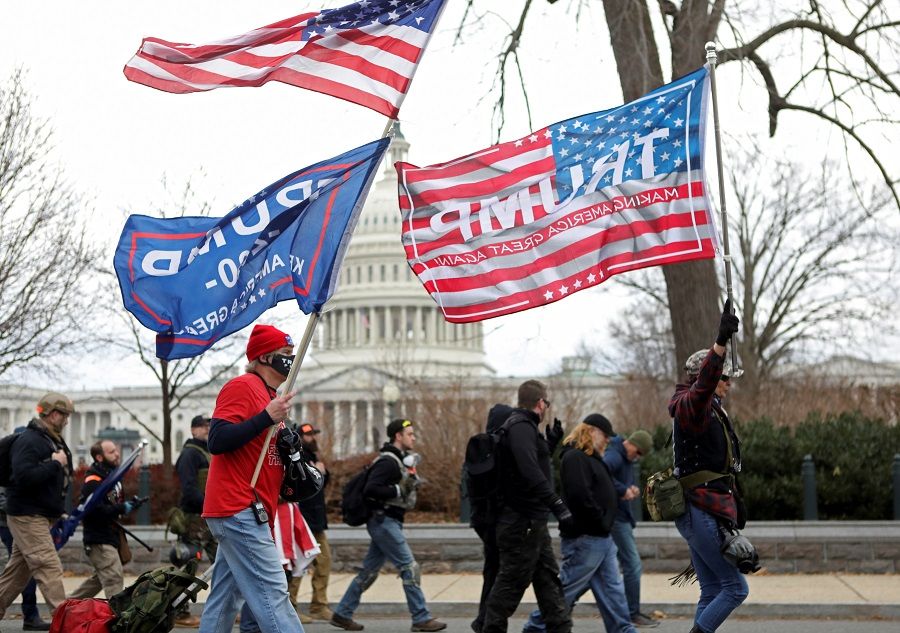
The Democratic Party has just adopted a party platform in 2020 centred around the middle class, and this includes foreign policy as well. In other words, all policies - including its policy towards China - must feed into enhancing the standing of the American middle class. This represents a departure from the traditional foreign policy revolving around promoting democracy and human rights, capital and globalisation. Because this is new and has never been practised before, it is easy to be hijacked by traditional interest groups, old habits, as well as the deep state. Biden may be carried by radical forces and collective inertia on the way to continued American decline.
One of the greatest challenges for the rise of China is the need to straighten out and coordinate its relationship with mainstream values instead of always fighting against them.
However, America's troubles do not necessarily translate to opportunities for China. One of the greatest hindrances to the rise of China is its failure to gain the acceptance of the mainstream countries. These countries see China as an alien entity. They fear the rise of China, and are driven by an almost instinctive impulse to contain the Eastern colossus. One of the important reasons for this is their difference in values.
Without a doubt, Biden will seek to build an alliance against China based on common values. One advantage enjoyed by the US vis-à-vis China is that the former's values have spread widely across the world and are dominant in major countries. This advantage will continue to exist even after China's GDP has surpassed America's. In contrast, the "China Model" is so strongly marked by Chinese characteristics that other countries can hardly identify with it, much less emulate it.
One of the greatest challenges for the rise of China is the need to straighten out and coordinate its relationship with mainstream values instead of always fighting against them. A rising great power needs a little more cosmopolitanism, rather than emphasis on its idiosyncrasies. This has always been the case in world history.
Related: Internal conflicts will be the downfall of the US | Donald Trump: The true 'Monkey King'? | The US remains leader and pioneer of civilised societies despite unsettled election | Globalisation and the American blue-collar workers who voted for Trump | Trump or Biden, the US is on a path of decline
